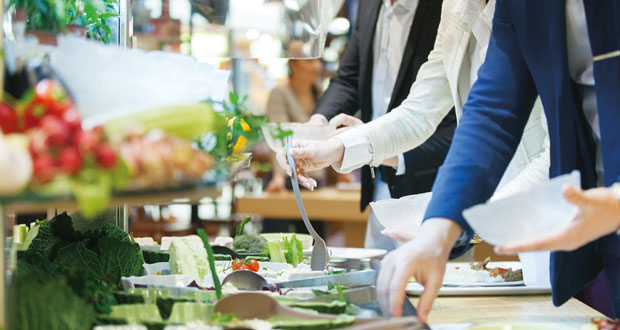Facilities Managers can work together with their foodservice partners to help solve the food waste problem and lower their carbon footprint, finds Sara Bean
Whether reviewing the carbon management of buildings or improving recycling and waste management, an increasingly important consideration to achieving net zero is in reducing food waste. Climate action NGO WRAP has estimated the hospitality and food service sector wastes 1.08Mt of food a year, when the majority (800,000 tonnes) could have been eaten.
Given this level of waste, foodservice suppliers are increasingly looking at ways to lower the carbon content of workplace meals. Foodservice and FM provider Sodexo defines a “low-carbon” meal as one whose production generates 0.9 kgCO2e or less. Based on this definition a series of new recipes are being introduced to ensure that 70 per cent of the main dishes on Sodexo’s menus can be labelled “low-carbon” by 2030.
Sodexo UK & Ireland has also stated that from January 2030, it will only work with supply partners who can demonstrate net zero progress through published reporting. Around 70 per cent of Sodexo’s supplier’s in the UK and Ireland are made up of Small and Medium Enterprises (SMEs) and Voluntary, Community and Social Enterprises (VCSEs), who cannot be expected to have teams dedicated to sustainability or afford consultancy support, which is why a supplier mentoring programme has been launched.
Explains Simon Mussett, Net Zero Lead, Sodexo UK & Ireland: “Our net zero supplier engagement strategy is focused on helping our suppliers who don’t necessarily have the resource or expertise. We have made it clear that from January 2030 we will only work with suppliers demonstrating tangible progress through published reporting. We are offering mentoring and support to those that need it.
“The next milestone in our strategy is already underway, requiring suppliers representing 75 per cent of our supply chain emissions to provide a detailed annual Carbon Reduction Plan, identifying opportunities for collaboration and areas of improvement by 2025. This is an opportunity for us to work with our partners to mutually drive down our GHG emissions footprint. This could be through moving to plant-based alternatives or lower mileage options as examples. Collaboration is key; together we can make a difference.”
FOOD & CLIMATE SUMMIT
In March of this year Compass Group UK & Ireland hosted 400 delegates from over 100 global and UK-based companies for a climate summit which featured leaders from the UK Government, UN and businesses. It followed the publication of the food and support services group’s transition plan where it reported a -9.4 per cent absolute reduction in emissions across Scope 1, 2, and 3 (FY19 baseline – FY23) inclusive of 20 per cent business growth.
Says Carolyn Ball, Director for Delivery of Net Zero, Compass Group UK & Ireland: “Within our transition plan we also provide context, to underline both the impact and challenges experienced by tens of thousands of people, serving 214 million meals a year across 4,000 locations; scale which helps to explain why emissions associated to purchases of food and drink are so material – representing 62.5 per cent of our FY23 footprint.”
“Throughout it, we share specific examples of what we’ve done to date – since the business made the necessarily ambitious commitment to reach climate net zero by 2030 – what we’re doing now and what we’re prioritising next.
“These issues are interlinked and we identify eight areas of focus, recognising the importance of driving change beyond emissions reduction. Our priorities are – water, animal welfare, biodiversity, deforestation, food and dietary health, food waste, packaging and non-food.”
At ISS, according to Linda Cregan, Food Services Director, food waste reduction is a key pillar of the group’s overall food sustainability action plan and is not only helping it run a more sustainable operation, but also helps to save money for clients.
Explains Cregan: “In 2021 ISS announced a global commitment to reduce food waste by 50 per cent by 2027 and we are pleased with our progress towards this. It has taken commitment from across all segments of our business, from hospitals, to schools and into the workplace, and at all levels, from our senior leaders who have committed budget for purchasing AI systems and allowed time to help monitor and track where our waste comes from, right through to individual place makers in kitchens up and down the country who have had to look at everything they do each day and ask themselves ‘can I do this differently?’”





